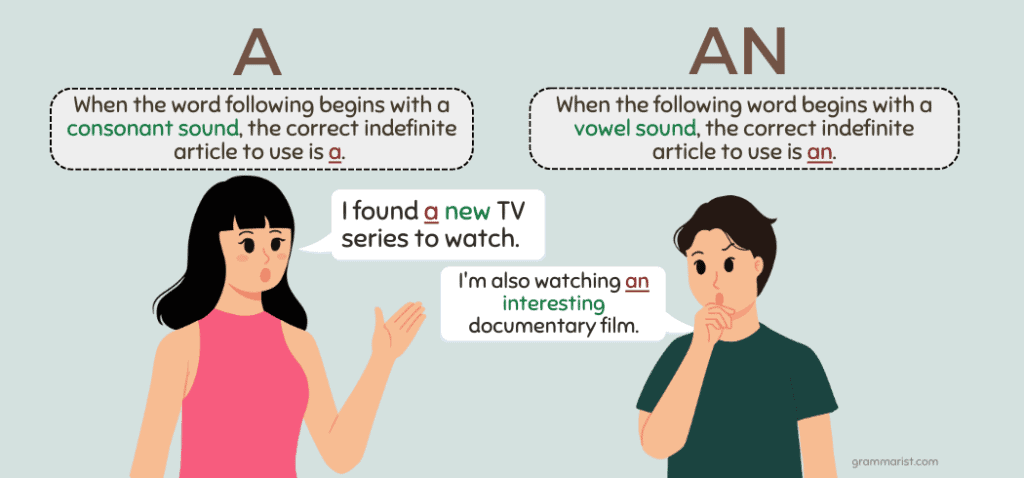The English language is full of grammar rules designed to help your writing and speech make sense to your audience. However, these rules often confuse anyone new to the language.
“A” and “an” are indefinite articles and work to modify the noun they precede. They are important to use to introduce proper grammar structure. But how do you know when to use “a” and when to use “an”?
Let’s review what an indefinite article is, how it differs from a definite article, and how to know the differences between using “a” and “an.”
What’s the Difference Between A and An?

A and an are indefinite articles. They are non-specific markers for singular nouns. A and an are used for addressing a thing in general, not addressing a specific item.
When the word following begins with a consonant sound, the correct indefinite article to use is a. When the following word begins with a vowel sound, the correct indefinite article to use is an.
Indefinite vs. Definite Articles
In the English language, there are only three articles: a, an, and the. And there are some very basic rules associated with their use.
The use of an indefinite article helps a reader understand the identity of the noun it comes before is general in nature or not defined. Use a or an before unknown singular nouns.
The use of a definite article helps a reader understand the identity of the noun it comes before is known. Use the before known singular or plural nouns.
How to Use A
A is always used when the word following begins with a consonant sound, even if the word following is a modifier of the noun that a is marking.
For example:
- The city broke ground for a new memorial park last summer.
- I’m going to be teaching a college course this summer at my alma mater.
- The doctors said my achy joints were a result of a virus I had recovered from.
How to Use An
An is always used when the word following begins with a vowel sound, even if the word following is a modifier of the noun that an is marking.
For example:
- It felt like it took an age to finalize the portfolio required as part of the literary class.
- I can’t wait to embark on an adventure to the Aegean this summer.
- Traveling the world has been an eye-opening experience.
Exceptions to the Rules
When “u” creates the “y” sound similar to “you” or “o” creates the “w” sound similar to “won,” then there is an exception to the use of an with a vowel.
These examples have consonantal properties and should be treated as a consonant – thus requiring the use of a.
For example:
- My friends formed a united front to stand against the poor judgment of local community leaders.
- When I was three, all I wanted was a unicorn for my birthday.
- One of the most famous stories was jotted down on a used napkin at a coffee house.
- My grandfather was a one-legged war veteran who ran marathons for charity.
The Controversy Surrounding “H”
There is a controversy surrounding the letter “h.” In many cases, “h” is silent or unsounded due to pronunciation. This means that you should use an because the words begin with the vowel sound “on” and not a consonant sound.
For example:
- It was an honorable award to have won.
- She made an honest error in judgment.
However, you do not apply this to all words that begin with “h.” Only use an with the “on” sound.
For example:
- The U.S. Civil War is a historical event that is well-studied throughout the world.
Let’s Review
A and an are indefinite articles that help define nouns as a general or unknown singular subject matter. Use a with consonant sounds and an with vowel sounds.
